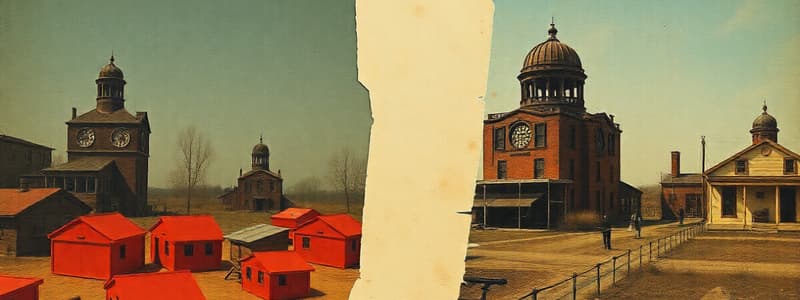Podcast
Questions and Answers
The final temperature will be ______ degrees Celsius.
The final temperature will be ______ degrees Celsius.
80
The mass of the block of metal is ______ kg.
The mass of the block of metal is ______ kg.
1.5
The power of the heater is ______ kilowatt.
The power of the heater is ______ kilowatt.
5.4 times 10 power negative 2
The time taken for heating is ______ seconds.
The time taken for heating is ______ seconds.
The quantity of heat supplied by the heater is ______ joules.
The quantity of heat supplied by the heater is ______ joules.
The change in temperature is ______ degrees Celsius.
The change in temperature is ______ degrees Celsius.
The specific heat capacity of the metal block is ______ joules per kilogram per kelvin.
The specific heat capacity of the metal block is ______ joules per kilogram per kelvin.
The quantity of heat is defined as a form of energy that flows from a body of a higher temperature to a body which is at a lower ______.
The quantity of heat is defined as a form of energy that flows from a body of a higher temperature to a body which is at a lower ______.
Heat capacity is denoted by the capital letter ______.
Heat capacity is denoted by the capital letter ______.
The SI unit for the quantity of heat is ______.
The SI unit for the quantity of heat is ______.
Specific heat capacity is denoted by a small letter ______.
Specific heat capacity is denoted by a small letter ______.
The change in temperature for calculations is denoted by the Greek letter ______.
The change in temperature for calculations is denoted by the Greek letter ______.
To find the quantity of heat, one can use the formula Q = mCθ, where Q is the quantity of heat, m is the mass of the substance, C is the ______ heat capacity, and θ is the temperature change.
To find the quantity of heat, one can use the formula Q = mCθ, where Q is the quantity of heat, m is the mass of the substance, C is the ______ heat capacity, and θ is the temperature change.
In a cooling process, the final temperature is ______ than the initial temperature.
In a cooling process, the final temperature is ______ than the initial temperature.
When the power of a heater is used, the heat loss by the heater can be calculated by multiplying ______ and time.
When the power of a heater is used, the heat loss by the heater can be calculated by multiplying ______ and time.
Flashcards
Heat Capacity (C)
Heat Capacity (C)
The amount of heat energy required to raise the temperature of a given mass of a substance by 1 Kelvin.
Specific Heat Capacity (c)
Specific Heat Capacity (c)
The amount of heat energy needed to raise the temperature of one unit mass of a substance by 1 Kelvin.
Quantity of Heat (Q)
Quantity of Heat (Q)
The amount of heat energy transferred or absorbed by a substance.
Temperature Change (θ)
Temperature Change (θ)
Signup and view all the flashcards
What is the relationship between heat capacity and specific heat capacity?
What is the relationship between heat capacity and specific heat capacity?
Signup and view all the flashcards
What is the formula to calculate quantity of heat (Q) using specific heat capacity?
What is the formula to calculate quantity of heat (Q) using specific heat capacity?
Signup and view all the flashcards
What is the formula to calculate quantity of heat (Q) using heat capacity?
What is the formula to calculate quantity of heat (Q) using heat capacity?
Signup and view all the flashcards
How is the conservation of energy applied to heating and cooling processes?
How is the conservation of energy applied to heating and cooling processes?
Signup and view all the flashcards
Electrical Power
Electrical Power
Signup and view all the flashcards
Quantity of Heat Supplied
Quantity of Heat Supplied
Signup and view all the flashcards
Heat Capacity
Heat Capacity
Signup and view all the flashcards
Change in Temperature
Change in Temperature
Signup and view all the flashcards
Specific Heat Capacity
Specific Heat Capacity
Signup and view all the flashcards
What is the formula to calculate heat capacity?
What is the formula to calculate heat capacity?
Signup and view all the flashcards
What is the formula to calculate specific heat capacity?
What is the formula to calculate specific heat capacity?
Signup and view all the flashcards
Study Notes
Quantity of Heat
- Heat is energy transfer due to a temperature difference. It flows from warmer to cooler objects.
Heat Capacity
- Heat capacity (C): The heat required to raise the temperature of a given mass of a substance by 1 Kelvin.
- Units: Joules per Kelvin (J/K)
- Formula: C = Q / θ (where Q = heat energy and θ = temperature change)
- Heat capacity applies to a given mass (not a specific amount).
Specific Heat Capacity
- Specific heat capacity (c): The heat required to raise the temperature of one unit of mass (1 kg) of a substance by 1 Kelvin.
- Units: Joules per kilogram per Kelvin (J/kg⋅K)
- Formula: c = Q / (m * θ) (where m = mass and θ = temperature change)
Quantity of Heat (Q)
- Formula (using specific heat capacity): Q = m * c * θ (mass × specific heat capacity × temperature change)
- Formula (using heat capacity): Q = C * θ (heat capacity × temperature change)
Examples
-
Example 1 (Using heat capacity): To raise the temperature of a metal block (heat capacity = 460 J/K) from 15°C to 45°C, Q = 13,800 J
-
Example 2 (Using specific heat capacity): A 60g copper piece (0.06kg) cools from 90°C to 40°C, losing Q = 1170 J.
-
Example 3 (Finding final temperature): A 50g (0.05kg) water sample is heated from 20°C by a 42W heater for 5 minutes (300 sec). The final temperature is 80°C.
-
Example 4 (Finding heat capacity and specific heat capacity): A 1.5 kg metal block is heated from 30°C to 50°C (20 K temperature difference). The electrical heater delivers 27,000 J of heat to the metal block. The heat capacity is 1350 J/K, and the Specific heat capacity is 900 J/kg⋅K.
Important Concepts
- Temperature change can be expressed in Celsius or Kelvin; the numerical value is the same.
- Always use SI units (kilograms, Kelvin) in calculations.
- The heating/cooling substance gains/loses heat corresponding to the source/heater.
- Temperature changes are calculated as the absolute differences between the initial and final temperatures.
Studying That Suits You
Use AI to generate personalized quizzes and flashcards to suit your learning preferences.




